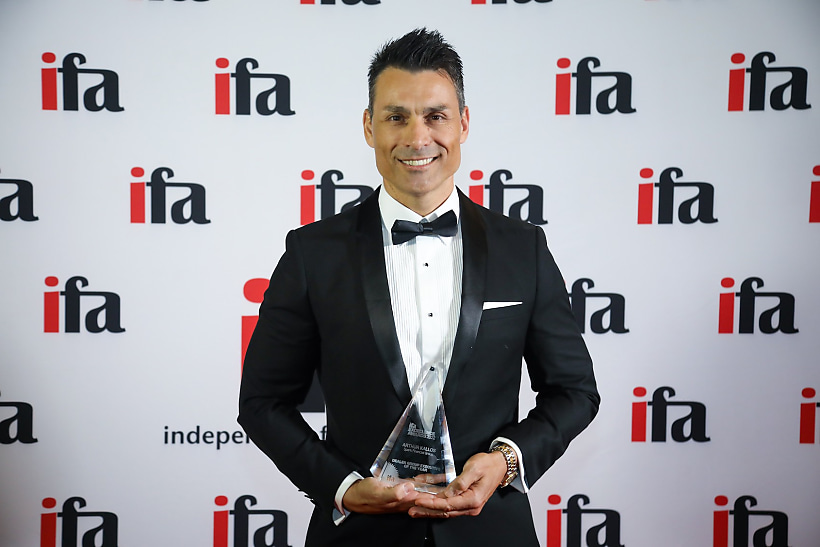Profit for purpose: How one dealer group is rethinking advice
Arthur Kallos, founder and CEO of boutique dealer group Spark Financial Group, was recently named Dealer Group Executive of the Year at the 2022 ifa Excellence Awards. Find out why so many financial advisers are attracted to his philanthropic approach to wealth management.
- A
- A
- A

Arthur Kallos is the majority shareholder of Spark Financial Group. He recently announced that he would sell down his ownership in stages to a philanthropic syndicate. Not your ordinary succession plan. But don’t worry — he’s not going anywhere.
“We’re transitioning to a completely profit-for-purpose financial services organisation,” he says. “I’m essentially donating my business to a philanthropic syndicate over a period of about five years.”
From 1 July 2023, all profits generated by Spark Financial Group will be used to support charitable programs. Meanwhile, the money he makes from selling the business will be invested, and the earnings from those investments will be used to provide financial advice to those who cannot afford it.
“It will be a charity fund, which advisers can access in the form of grants to go out and help Australians who need advice but can’t afford it,” Mr Kallos says.
"There are so many Australians who desperately need advice but can’t afford it. Unfortunately, many advisers in the country cannot engage these people for many reasons,” he says. “As a result, they are actually missing a huge opportunity to help someone and gain a valuable experience."
Financial advisers operating under Spark’s Australian Financial Services Licence (AFSL) will have the choice of providing pro bono services or having part of their services subsidised by a grant, for which there will be a formal application process.
Attracting the right talent
There are many different reasons why Mr Kallos decided to commit the business to philanthropy. One is to attract like-minded financial advisers who also believe in helping those less fortunate.
“We want to continue to build an organisation that is taking action to make advice affordable and accessible to more Australians. We can’t leave it up to the government or regulators. It needs to come from the industry. We need to take leadership.”
He says he has always wanted to implement change at a scale that will make a difference. Mr Kallos has been involved in the financial services industry for over 20 years and has heard the same ineffective discussions about accessible advice.
“I figured that if I could create an organisation of like-minded individuals who want to go out and contribute to society and devote their time, energy and resources to Australians who can’t afford advice, that’s the only way to solve the problem,” he says. “No legislative change or technology is going to resolve the issue.”
He believes that the majority of advisers enter the industry because they want to help people. But over time the industry has moved away from that goal and is becoming increasingly self-serving.
“Now the focus is on how efficiently and profitably you can deliver advice, which technology is the best, how the regulation will change. But you actually need to think outside the box and take the lead.”
A point of difference
It’s no secret that financial advice has a credibility problem. While price is an issue for many Australians, there is also years of negative press that still haunts the profession.
Mr Kallos hopes that helping more Australians who usually wouldn’t be able to afford advice will help reframe the value of advice to the broader community. In this way, philanthropy can lift the credibility of the profession.
“Whether advisers are doing pro-bono work or using our grants, those professionals will gain tremendous life experience and be practicing what they preach, building credibility and falling in love with what they do,” he says. “It builds stronger businesses that are actually making advice more accessible through their actions.”
It’s also a point of difference that will attract greater client diversity. There is plenty of evidence of the business benefits of pro-bono work in the legal space, for example, where a clear link has been established between performance and employee engagement.
For Mr Kallos, philanthropy is firmly at the heart of his business.
“Last week I was helping a woman who was living in a halfway house. She has five dependents,” he explains. “She sold a property and had $100,000 in the bank. Other than that, she had no income or means of supporting herself or her children. She wanted to get government housing, but there are thresholds for how much money you can have. She needed advice.”
Mr Kallos created a strategy to get the client under the public housing threshold and invest for her children’s future.
“I did that pro bono,” he says. “Without that advice, this woman would have spent that $100,000 on rent for two years and then be on the street with her kids,” he says. “Financial advice isn’t about making people wealthy. Sometimes it’s simply about helping people survive.”
Subscribe to 
Never miss the stories that impact the industry.






